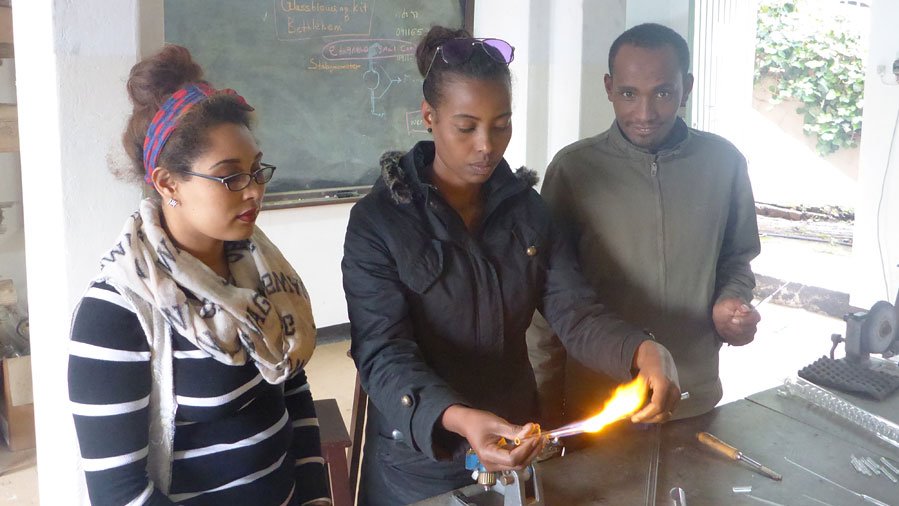A workshop on making glass apparatuses
An invitation to Addis Ababa

Is glassblowing important in Africa at all?
Definitely. However, the department in Addis Ababa had become more or less inactive. The director of the department is 75 years old and the appliances are all outdated. It is very important to promote glassblowing there and to provide training opportunities. There are enough people who are interested – but, unfortunately, there’s not enough money. That’s why we are currently looking for sponsors and investors who would be interested in making long-term changes possible.
How long was your stay last?
I was there for a week. From Monday to Friday, I visited the university – and at the weekend, I went on a trip to the scientific gardens of Prof. Ermias Dagne, who was also my contact person at the university.
How did your workshop go?
It was a kind of crash course in which I taught my four interns basics such as pulling points, and how to make bows and tee-pieces.
Why were there only four participants?
The workshop is very small, and there is a lack of materials. So, unfortunately, we weren’t able to have a higher number of participants. But our four participants were incredibly inquisitive and motivated. In order to teach glassblowing, you have to rely on demonstration a lot. Also, I often have to interfere when my interns try out work steps. For the Africans, that wasn’t a problem – that can be quite different in Germany. Also, the working atmosphere is different in Africa; there’s a lot of commotion, and all the doors are open.
Did you experience any difficulties regarding communication.
Much less than I had feared, luckily. In addition, the daughters of a university employee served as interpreters for two afternoons. They attend a German school in the city, and they were of great help to avoid misunderstandings.
What are your lasting impressions of Africa?
Primarily, I was impressed by the people. Despite the prevailing poverty, they are always friendly, cheerful, and very welcoming. They are also very industrious and willing to work hard. The country itself is very impressive too. Addis Ababa is located in a highland, and the landscape is very green and beautiful. I was also fascinated by how much is going on in the country – and how many young people are out and about there. It’s a completely different world.
Does the glassblowing workshop only produce devices for use in the field of Chemistry?
That has changed a lot. Nowadays, the appropriate term would be something like “scientific-technical glass apparatus construction” – and we make equipment for almost all areas of the university, even for Mechanical Engineering. We don’t just repair simple flasks any more, we often do very sophisticated repair work that is very expensive. The overall picture is changing significantly, in Africa as well. There is also a considerable shortage of skilled workers.
The glassblowing workshop at TUM is part of the Faculty of Chemistry in Garching – and experts from thesector will be meeting up there soon: The first symposium on scientific and technical glass apparatus construction will take place at the Center for Energy and Information (ZEI) from April 19 to 21, 2018. More information: www.glas-apparatebau.de
More information:
Scientifice Glassblowers Workshop